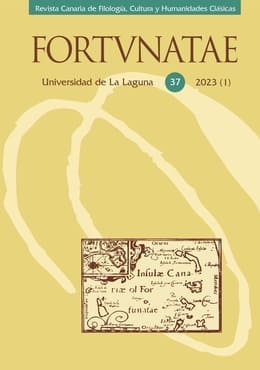Polybium secuti sumus? Los desacuerdos respecto a la génesis de la Primera Guerra Macedónica en las Historias y Ab Vrbe Condita
Resumen
En este artículo se busca demostrar que el análisis de los libros 22 y 23 de Ab Vrbe Condita no revela evidencia suficiente para argumentar que Livio conociera la versión sobre la génesis de la Primera Guerra Macedónica que encontramos en las Historias de Polibio. En cambio, el libro 24 incluye un capítulo (24.40) que presenta características que hacen posible esa relación, aunque también contiene importantes diferencias respecto a pasajes posteriores de los libros 26-29, en donde el vínculo entre ambas obras es más claro. Asimismo, el capítulo del libro 24 se encuentra aislado de otras menciones importantes a este enfrentamiento en los libros 23-25. Por estas razones, en esta investigación se busca demostrar que si Livio conocía el texto del historiador griego al escribir sus primeros cinco libros de la tercera década, debió utilizarlo poco para la narración de los años iniciales de la guerra (216-212 a. C.). Esto, a su vez, tiene implicancias importantes para el estudio de la relación entre ambos autores a lo largo de la problemática tercera década.
Citas
BADIAN, E. (1952): «Notes on Roman Policy in Illyria (230-201 B.C.)», PBSR 20: 72-93.
BICKERMAN, E. J. (1944): «An Oath of Hannibal», TAPhA 75: 87-102.
BICKERMAN, E. J. (1952): «Hannibal’s Covenant», AJPh, 73 (1): 1-23.
BONJOUR, M. (1975): Terre natale: études sur une composante affective du patriotisme romain, Les Belles Lettres, Paris.
BOSWORTH, A. B. (2003):«Plus ça change. Ancient Historians and their Sources», ClAnt. 22 (2): 167-198.
BÖTTCHER, C. (1869): Kritische Untersuchungen über die Quellen des Livius im XXI und XXII Buch,Teubner, Leipzig.
BURCK, E. (1971): «The Third Decade», en T. A. DOREY (ed.), Livy, Routledge, London, pp. 21-46.
BURTON, P. J. (2011): Friendship and Empire. Roman Diplomacy and Imperialism in the Middle Republic (353-146 BC), Cambridge University Press, Cambridge.
CHAMPION, C. B. (1997): «The Nature of Authoritative Evidence in Polybius and Agelaus’ Speech at Naupactus», TAPhS 127: 111-128.
CHAMPION, C. B. (2000): «Romans as ΒΑΡΒΑΡΟΙ:Three Polybian Speeches and the Politics of Cultural Indeterminacy», Cph 95, 4: 425-444.
CHAMPION, C. B. (2004): Cultural Politics in Polybius’ Histories, University of California Press, Berkeley.
CHAMPION, C. B. (2005): «Livy and the Greek Historians from Herodotus to Dionysius», en B. MINEO (ed.), A Companion to Livy, pp. 190-205, Wiley - Blackwell, Malden - Oxford - Chichester.
CHAPLIN, J. D. (2001): Livy’s Exemplary History, Oxford University Press, Oxford.
D’AGOSTINI, M. (2011): «Filippo V e la Storia Romana di Appiano», Aevum 85 (1): 99-121.
DAVIDSON, J. (1991): «The Gaze in Polybius’ Histories», JRS 81: 10-24.
DE JONG, I. J. F. (2014): Narratology and Classics. A Practical Guide, Oxford University Press, Oxford.
DE SANCTIS, G. (1917): Storia dei Romani. Vol. III.2 L’Età delle Guerre Puniche, Fratelli Bocca Editori, Torino.
ECKSTEIN, A. M. (1994): «Polybius, Demetrius of Pharus, and the Origins of the Second Illyrian War», Cph 89 (1): 46-59.
ECKSTEIN, A. M. (2008): Rome Enters the Greek East. From Anarchy to Hierarchy in the Hellenistic Mediterranean, 230-170 BC, Blackwell Publishing, Oxford.
EGELHAAF, G. (1879): «Vergleichung der Berichte des Polybius und Livius ueber den Italischen Krieg der Jare 218-217 bis zur Schlacht am Trasimener See», Jahrbücher für classische Philologie 10: 473-524.
ERRINGTON, R. M. (1989):«Rome and Greeceto 205 B.C.»,en AA. VV.,The Cambridge Ancient History, Cambridge University Press, Cambridge, pp. 81-106.
FELDHERR, A. (1998): Spectacle and Society in Livy’s History, University of California Press, Berkeley.
FÖHLISCH, C. (1884): «Über die Benutzung des Polybius im XXI. und XXII. Buche des Livius. Eine Quellenuntersuchung», Jahresbericht für das Schuljahr 1883-1884, 558: 1-11.
FRIEDERSDORFF, F. (1869): Livius et Polybius. Scipionis rerum scriptores, Kaestner, Göttingen.
HAMMOND, N. G. L. (1968): «Illyris, Rome and Macedon in 229-205 B.C.», JRS 58 (1 & 2): 1-21.
HESSELBARTH, H. (1882): Historisch-kritische Untersuchungen im Bereiche der dritten Dekade des Livius, Lippstadt.
HESSELBARTH, H. (1889): Historisch-kritische Untersuchungen zur dritten Dekade des Livius, Verlag, Halle.
HIRSCHFELD, O. (1877): «Hat Livius mi 21. und 22. Buche den Polybius benutzt?», Zeitschrift für die österreichischen Gymnasien 28: 801-811.
HOLLEAUX, M. (1921): Rome, la Grèce et les Monarchies Hellénistiques au IIIº siècle avant J.-C. (273-205), de Boccard, Paris.
HOLLEAUX, M. (1930): «Rome and Macedon: Philip against the Romans», en AA. VV., The Cambridge Ancient History Vol. VIII. Rome and the Mediterranean 218-133 B.C., Cambridge University Press, Cambridge, pp. 116-137.
JAEGER, M. (1997): Livy’s Written Rome, The University of Michigan Press, Michigan.
KAHRSTEDT, U. (1913): Geschichte der Karthager von 218-146, Weidmannsche, Berlin.
KLOTZ, A. (1941): Livius und seine Vorgänger, Teubner, Leipzig.
LACHMANN, F. (1828): De fontibus historiarum T. Livii. Commentatio altera, Dietrich, Göttingen.
LEVENE, D. S. (2010): Livy on the Hannibalic War, Oxford University Press, Oxford.
LUCE, T. J. (1977): Livy. The Composition of His History, Princeton University Press, Princeton.
LUCE, T. J. (1987): «Ancient Views on the Causes of Bias in Historical Writing», Cph 84 (1): 16-31.
LUTERBACHER, F. (1875): De fontibus librorum XXI et XXII Titi Livii, Truebner, Straßburg.
MARINCOLA, J. (1997): Authority and Tradition in Ancient Historiography, Cambridge University Press, Cambridge.
MICHAEL, W. (1867): De ratione qua Livius in tertia decade opere Polybiano usus sit, Karl Georg, Bonn.
MILES, G. (1995): Livy. Reconstructing Early Rome, Cornell University Press, Ithaca - London.
MILTSIOS, N. (2013): The Shaping of Narrative in Polybius, De Gruyter, Berlin.
MOLES, J. (1994): «Livy’s Preface», PCPhS 39: 141-168.
MOORE, J. M. M. (1965): The ManuscriptTradition of Polybius, Cambridge University Press, Cambridge.
MORENO LEONI, A. M. (2012): «Interpretando el mundo romano: etnografía, público y cultura griega en las ‘‘Historias’’ de Polibio», Gerión 30: 63-90.
MORENO LEONI, A. M. (2017): Entre Roma y el mundo griego. Memoria, autorrepresentación y didáctica del poder en las Historias de Polibio, Editorial Brujas, Córdoba.
MÜLLER, A. (1882): De Auctoribusrerum a M. Claudio Marcello in Sicilia gestarum, Orphanotrophei, Halle. NIEBUHR, B. (1875): Lectures on Roman History. Vol. 1, Chatto & Windus, London.
NISSEN, H. (1863): Kritische Untersuchungen über die Quellen der vierten und fünften Dekade des Livius, Weidmannsche Buchhandlung, Berlin.
NITZSCH, K. W. (1854): «Quintus Fabius Pictor über die ersten Jahre des Hannibalischen Krieges», Allgemeine Monatsschrift für Wissenschaft und Literatur: 67-84.
PÉDECH, P. (1964): La méthode historique de Polybe, Les Belles Lettres, Paris.
PETER, C. (1863): Livius und Polybios. Ueber die Quellen des XXI. und XXII. Buchs des Livius, Verlag, Halle.
RICH, J. (1984): «Roman aims in the First Macedonian War», PCPhS 30: 126-180.
ROOD, T. (2004): «Polybius», en I. DE JONG - R. NÜNLIST - A. BOWIE, Narrators, narratees, and narratives in Ancient Greek Literature, Brill, Leiden, pp. 147-164.
ROOD,T. (2007):«Polybius»,en I. DE JONG - R. NÜNLIST, Time in Ancient Greek Literature, Brill, Leiden, pp. 165-181.
SCOTT, F. A. (1873): Macedonien und Rom während des hannibalischen Krieges, Schade, Berlin.
SOLTAU, W. (1891-1893): «Coelius und Polybius im 21. Buche des Livius», Philologus 6 Supp. Bd.: 699-726.
SOLTAU, W. (1894a): Livius’ Quellen in der III. Dekade, Mayer & Müller, Berlin.
SOLTAU, W. (1894b): «Die griechischen Quellen in Livius’ 23.-30. Buch», Philologus 53: 588-628.
SOLTAU, W. (1897): Livius’ Geschichtswerk. Seine Composition und seine Quellen, Dieterich’sche Verlags-Buchhandlung, Leipzig.
TILLMANNS, L. (1861): «Quo libro Livius Polybii historiis uti coeperit», Neue Jahrbücher für Philologie und Paedagogik 31 (83): 844-854.
TRÄNKLE, H. (1977): Livius und Polybios, Schwabe & Co - Verlag, Basel - Stuttgart.
VON STERN, E. (1891): «Das hannibalischeTruppenverzeichnis bei Livius. (XXI, c. 22)», Berliner Studien für classische Philologie und Archaeologie 12 (2): 1-37.
WALBANK, F. W. (1967b): Philip V of Macedon, Archon Books, Hamdem.
WALBANK, F. W. (1985): «Symploke: its role in Polybius’ Histories», en F. W. WALBANK, Selected Papers: Studies in Greek and Roman History and Historiography, Cambridge University Press, Cambridge, pp. 197-212.
WALSH, P. G. (1955): «Livy’s Preface and the Distortion of History», AJPh 76 (4): 369-383.
WALSH, P. G. (1961): Livy. His Historical Aims and Methods, Cambridge University Press, Cambridge.
WITTE, K. (1910): «Über die Form der Darstellung in Livius Geschichtswerk», Rheinisches Museum für Philologie, Neue Folge 65: 270-305 & 359-419.
Los autores conservan los derechos de autor y garantizan a la revista el derecho de ser la primera publicación del trabajo al igual que licenciarlo bajo una Creative Commons Attribution License que permite a otros compartir el trabajo con un reconocimiento de la autoría del trabajo y la publicación inicial en esta revista.
Los autores pueden establecer por separado acuerdos adicionales para la distribución no exclusiva de la versión de la obra publicada en la revista (por ejemplo, situarlo en un repositorio institucional o publicarlo en un libro), con un reconocimiento de su publicación inicial en esta revista.






